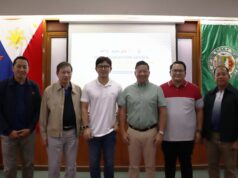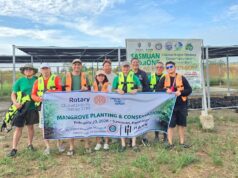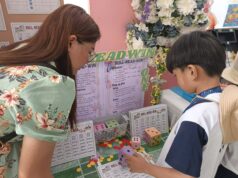(Sweden Ambassador Harald Fries (right) gives Secretary Tugade a Dala horse, a token in Sweden for good luck, after his speech. At left is Matin Glauvann from the Embassy of Sweden. Photo by Ashley Manabat)
CLARK FREEPORT – A discussion on collaborative ways to create so called “smart cities” was held between the Philippines and Sweden at the Quest Hotel here on Thursday.
“A smart city is an urban area that uses different types of electronic data collection sensors to supply information which is used to manage assets and resources efficiently which includes data collected from citizens, devices and assets that is processed and analyzed to monitor and manage traffic and transportation systems, power plants, water supply networks, waste management, law enforcement, information systems, schools, libraries, hospitals and other community services,” according to Wikipedia.
The event, which was the first ever discussion between the Philippines and Sweden with vital national government officials and business leaders and their Swedish counterparts as speakers, was meant to strengthen the partnership between the two countries by sharing best practices, solutions and experiences in building smart and sustainable cities of the future in the areas of energy, transport and public safety.
“This collaboration comes at a critical time when cities and communities around the world are facing new challenges in providing decent quality of life for its citizens,” Sweden Ambassador to the Philippines Harald Fries said during his welcome remarks. “Rapid urbanization continues to have impact on livability,” he added.
Fries pointed out that by 2050, “the estimated share of global urban population in total population is projected to have risen to 68 percent from 55 percent today.”
He added that in the Philippines, the rate is now at 44 percent while Sweden is already at 86 percent. “Sweden is strongly committed to the sustainability goals and in the inclusive, safe, resilient and sustainable human settlements,” Fries said. “Sweden has been ranked as best positioned to achieve the sustainable development goals,” he added.
“Given the paramount importance of building the quality of life for Filipinos today and the next generations, it is my wish that this collaboration is not a one-time exercise. I hope that it will be a good start,” Fries said.
In his keynote speech, Transportation Secretary Arthur P. Tugade said the government is now building smart infrastructures powered by technology.
“World Bank data shows that the Philippines is 20 years behind the expected infrastructure that has to be in place for any country to be fully developed,” Tugade said. He said this created the stimulus for President Rodrigo Duterte to declare that within his term, the Philippines will experience the Golden Age of Infrastructure.
“It will be an infrastructure that will provide mobility and interconnectivity within the country’s archipelago and with the rest of the world,” Tugade said.
Even if the government has already undertaken several infrastructure projects from roads to bridges, Tugade said these are still lacking.
“We have to do a lot of planning and pushing so that we can achieve a smart infrastructure,” Tugade said.
BCDA
Bases Conversion and Development Authority (BCDA) executive vice president Aileen Soza, who was able to visit two smart cities in Sweden, said in developing smart cities,” there must be emphasis on giving back the city’s roads and streets to pedestrians to be more walkable, and technology has a great role for the next generation of transport and travel.”
She said “In building a smart city, you don’t look at five years from now but you look at 20 years from now and therefore you have to be inward-looking and be future-proof in your plans.”
Meanwhile, aside from this freeport, Ulf Wennbom, Business Sweden country manager-Philippines, said they are also surveying Davao, Cebu and Iloilo “as our prime targets for smart city collaboration.”
He said the main areas of the collaboration are in “intelligent transport solutions, public safety and digitalization in public safety using connected cameras; and renewable energy.”
Wennbonn pointed out that “bureaucracy and corruption” as major challenges in investments. “There are commitments made but it takes quite a long time before projects are implemented. The administration is battling corruption and we also see change,” he said.
In assessing on the collaboration, Wennbonn said: “it is sincere, it’s good that you have a drive from the private sector. It’s the private sector that actually drives this with support from the government. We hope that the academia side would also take a stronger part. We look at a lot of knowledge transfer, and we want to equip all Filipinos to innovate as we want to partner in industrial development.”





